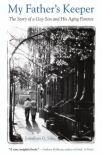My Father's Keeper: The Story of a Gay Son and His Aging Parents, Jonathan Silin [uplifting novels .TXT] 📗

- Author: Jonathan Silin
Book online «My Father's Keeper: The Story of a Gay Son and His Aging Parents, Jonathan Silin [uplifting novels .TXT] 📗». Author Jonathan Silin
I wondered then, and continue to wonder now, why it was me and not my mother who he called, who he blamed, and who he ultimately trusted to tell him the truth.
My father’s feelings of betrayal are justified. Not because I used his name in my articles on gay politics or because I recommended the operation he thought had failed, but because I am claiming new powers as he has difficulties retaining old ones. And above all, because I will live and he will soon die. Asserting my difference at the exact moment when he needs me to be the same, to protect him from the on-86 n jonathan g. silin
slaught of old age, my father lashes out with a fundamental emotional truth. Betrayal is at the heart of our relationship. I have abandoned him, refusing the identification that he thinks would ensure his future.
In fact, I left my parents’ house long ago, during my early twenties, when I realized that my survival depended on constructing a life far away from the emotional morass in which they lived and through which they tried to control their children. Although I know this rejection was a source of deep pain for them, I have no regrets. Now that I have been drawn me back into their world, the conflicts that were packed away in old cedar chests, the resentments left hanging in upstairs closets, the ambivalence buried in basement storage bins are revisited. The demands of the present don’t leave much time for such musings, and I am suspicious of nostalgia anyway. I move forward by generating fresh texts and by giving life to new stories. It’s a confusing enterprise, however, for the process of separation is occurring at the same time as moments of the closest physical connection—when a dry mouth must be swabbed with a glycerin stick, a feeding tube filled with sustenance, a soiled diaper changed. Even as I write to differen-tiate myself, to leave them behind, I assure my continuing connection. After all, they have become both the subject matter without which I cannot work and from which I hope to free myself.
Yet at times I can’t help but agree with Nancy K. Miller who, in Bequest and Betrayal, describes her own effort to write about her father as the ultimate act of bad faith. In the Jewish tradition we are commanded to bear witness and to remember. At the very same time, however, we are asked to honor the biblical injunction not to look upon our father’s naked body, to respect his privacy. We are caught between contradictory demands. Writing the details of his life offers revenge for the wounds that he has inflicted, continues to inflict. In answer to the exposure that his death threatens, I make him vulnerable in my texts. He is needy, childlike, out of control. He is ego-centric, thankless, and without remorse. I write suspended between m y fat h e r ’ s k e e p e r n 87
anger, with its risk of mandatory repetition, and compassion, with its potential for idealization.
I lie to my parents when they ask about my work. My gerontolo-gist friend would call it a therapeutic lie. I tell them that I am writing about childhood. “Is it about, you know, that homosexual stuff?” my father probes. He still can’t use the word “gay,” and when he says “homosexual,” it sounds remote and forced. Hearing that he is detached but not disdainful, I take a deep breath and venture a little closer to the truth. “Well, dad, you know that I am writing about my own childhood, and so it’s got to include some gay stuff. Everything I write has something in it about being gay.” Tempted to go further, the gay stuff no longer the stumbling block, I wait silently for more questions, but none come. Like the good sex educator, I try to give enough information to satisfy his curiosity but not more than is actually being requested. Mine is a sin of omission.
At home again, I seek reassurance. On the shelf just above my desk, I find the purple-jacketed hardcover edition of Ruth Behar’s The Vulnerable Observer. Recommended two years previously by a close colleague, it has retained a place of primacy on top of my all-important stack of recently read books. A committed feminist and anthropologist, Behar intertwines her own stories—the death of her grandparents—with those of the people she studies—the mourning rituals of a village in southern Spain. She unashamedly writes to make sense of her own life as much as to understand larger social phenom-ena. I am deeply moved by her work. She encourages me as I struggle to write about my parents and childhood, my life, and the schools that I visit regularly.
It is a young student who, noticing a connection between Behar’s work and my own, refers me to an essay that at this moment confirms my decision not to talk further with my parents. Here Behar reveals the bitter enmity she endured from her father upon the publication of her first book, Translated Woman. None of her insights into the complex ways that personal and professional stories intersect make any 88 n jonathan g.





Comments (0)